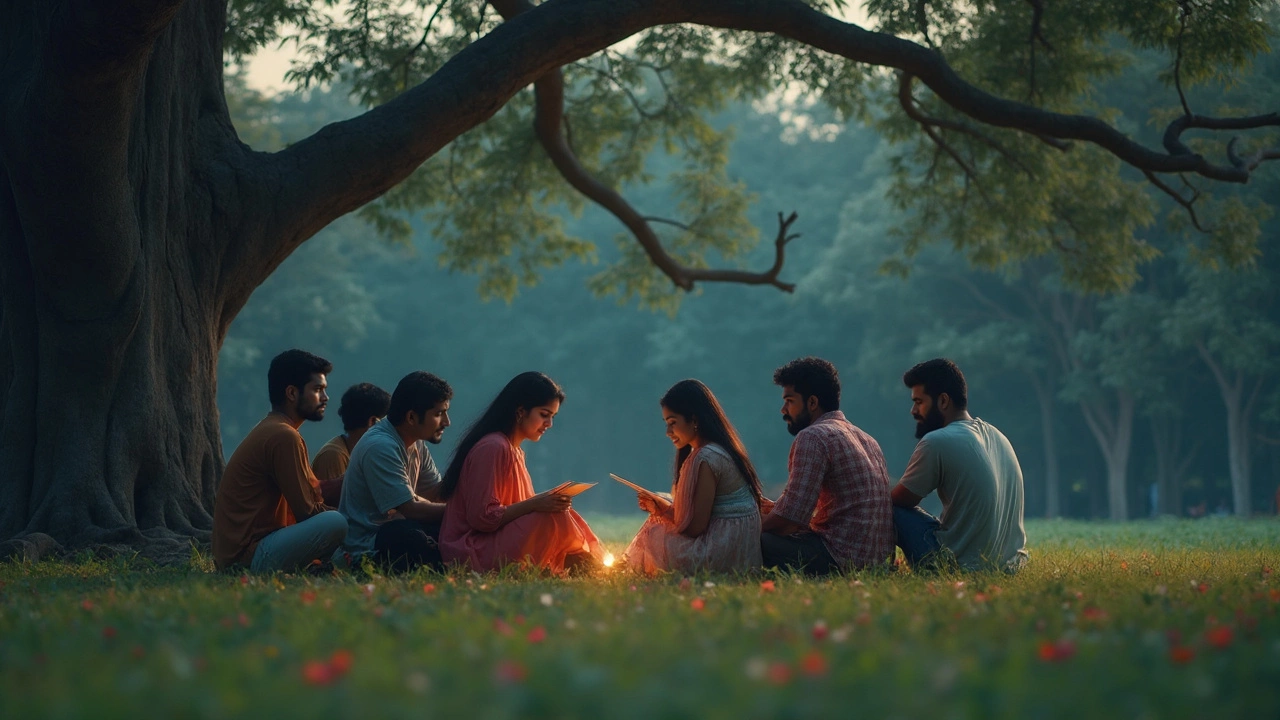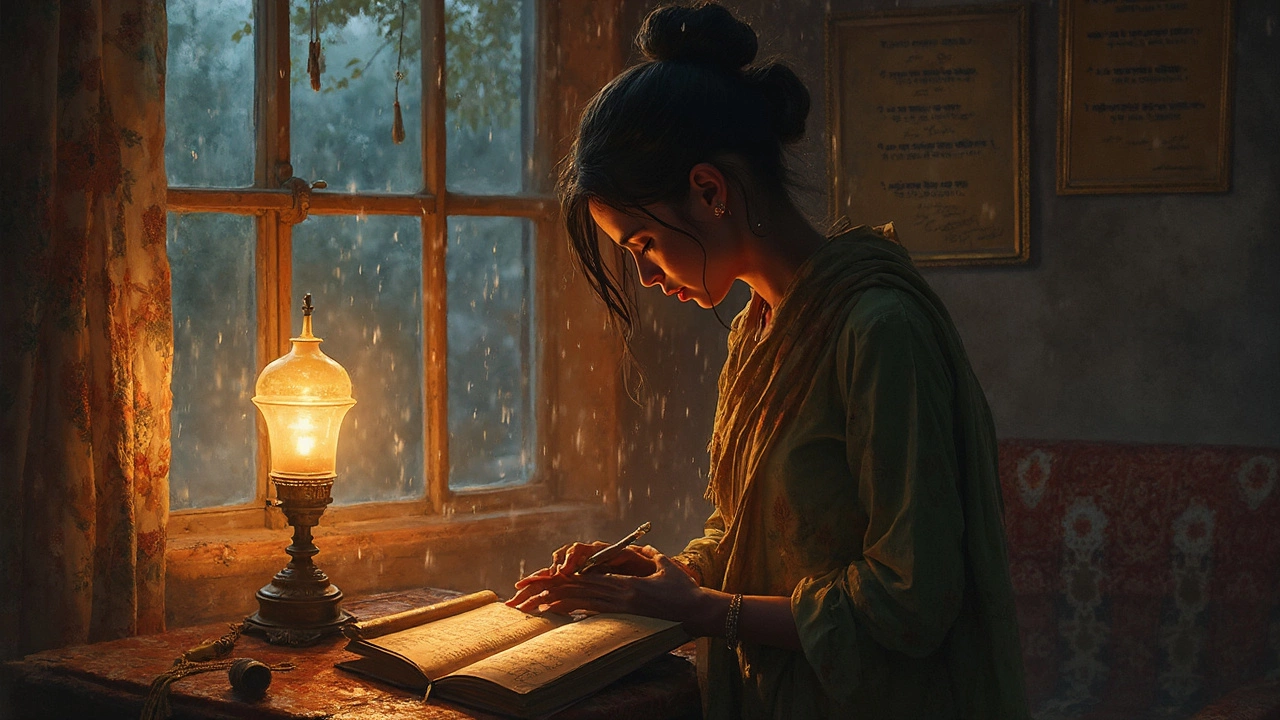Ever find yourself listening to the same sad song on repeat, or rereading an old poem that leaves a lump in your throat? You're definitely not alone. Melancholy can wrap around us like a favorite old blanket, even when we know it'll leave us a little heavier for it. There's something oddly satisfying about it.
In India, where poetry is part of daily life—from WhatsApp forwards to mushairas in college—sadness in verse is not just welcomed, it's celebrated. Why do we keep seeking out those lines that tug at old heartbreaks and losses? It's not just about wallowing. There's actually a psychological loop happening that can feel as sticky as scrolling doom-filled news or binging on nostalgia.
- Why We Keep Going Back to Sadness
- How Poetry Turns Pain into Comfort
- Melancholy and Indian Poetic Tradition
- Tips: Balancing Melancholy Without Getting Stuck
Why We Keep Going Back to Sadness
Ever notice how people keep circling back to stories or poems that make them sad? It’s weirdly common, and there’s some science behind it. When we dive into melancholy—especially sad poetry—our brains get a small dose of dopamine, the reward chemical. It might be counterintuitive, since dopamine is more famous for happy feelings, but even sadness can trigger it, especially when the emotion feels familiar and safe in a poem or a song. That’s one reason you might find yourself glued to your favorite heartbreak verse even on a good day.
Another big reason is nostalgia. Sad poetry in India often digs up old memories—breakups, goodbyes, that crush who never noticed you. Reliving those memories in a safe space, like a poem, lets us feel close to feelings and moments we’re scared to lose. According to a 2023 survey by an Indian literature group, nearly 62% of young adults said they turn to sad poetry India when they miss someone or are dealing with stress. It’s a coping mechanism, not just a habit.
Let’s keep it real—sad poetry and stories help us process tough feelings. They offer proof that we’re not alone in our pain. When you read a few lines and think, "Wow, someone else totally gets it," there’s comfort right there. It’s this sense of community, even in sadness, that draws people back in again and again.
| Reason | Percentage of Respondents |
|---|---|
| To remember old times | 38% |
| To process breakups or loss | 29% |
| To feel understood by others | 21% |
| General stress release | 12% |
If you’re wondering whether this behavior is strange or unhealthy, relax. Most people bounce back after a bout of sadness, and if anything, it helps them get back on their feet. The trick is knowing when it helps—and when it’s time for a mood reset.
How Poetry Turns Pain into Comfort
It sounds odd, but sad poetry really does make pain easier to handle. When someone reads a line that perfectly matches what they're feeling, it's like finding a friend who gets it. No need for small talk, just straight to the real stuff. That's one reason sad poetry has been so popular for centuries—because people recognize their own emotions wrapped up in a few powerful words.
Sad poetry India isn’t just for heavy days or heartbreaks. People use it to make sense of rough spots, breakups, loss, and even bittersweet nostalgia for things that never happened. Poems turn those messy feelings into something clear and shareable. Suddenly, your private troubles feel less lonely. The poet does the talking for you. Mirza Ghalib and Gulzar are textbook examples—fans cling to their lines not just for the fancy language, but because ordinary folks feel seen and understood.
There’s another thing: expressing sadness through poetry feels much safer than sharing it in person. You can send a poem to a friend, post it online, or just keep it on your phone—it's a low-stakes way of saying, "Hey, this is how I feel, but I don’t have to spell it out." This low-pressure outlet is why so many turn to melancholy when they’re down.
Scientists have actually looked into why this works. According to some studies from Indian universities in 2022, students who engaged with sad poetry India reported feeling more calm and connected, not more upset. It acts a bit like therapy—venting but in a structured, contained way.
If you want to use poetry to work through hard stuff, here’s what helps:
- Find poems that reflect, but don’t amplify, your feelings. Gulzar’s writing, for example, is honest but not hopeless.
- Write your own lines, even if they never leave your diary. Putting pain into words moves it from your chest to the page.
- Share poems with friends. Chances are, a lot of them have gone through similar things—and that connection heals more than you'd think.
So yes, poetry turns pain into something you can use. And in a culture where feelings are often kept under wraps, it’s a much-needed cheat code.

Melancholy and Indian Poetic Tradition
India’s relationship with melancholy in poetry runs deep—like, centuries old. Think of ghazals, the mushaira gatherings, or those late-night YouTube playlists filled with heartbreak shayari. There's a whole tradition built around turning sadness into something that's almost addictive. Even my son Rohan has asked why so many old songs sound so emotional—and why his grandfather hums them when it rains.
Classic Urdu poets like Mirza Ghalib and Faiz Ahmed Faiz made a name weaving tragedy into every couplet. Ghalib’s lines—like “hazāroñ ḳhvāhisheñ aisī ki har ḳhvāhish pe dam nikle”—aren't just old words. They nail the feeling of unsatisfied longing. These poems speak to heartbreak, unreturned love, and loneliness. That’s not just relatable; it’s almost universal. No wonder people keep coming back for more.
Hindi film music picked up this thread too. Ever noticed how most of Lata Mangeshkar’s timeless hits have sadness stitched into the lyrics? Some researchers looked at film music trends and noticed that nearly 40% of popular Hindi songs between 1950-1980 revolved around themes of loss or separation. That’s not just a minor theme—it’s a core part of what people want to hear.
The regional poetry scenes—Tamil, Bengali, Punjabi, Malayalam—aren't much different. Rabindranath Tagore used sadness not as an ending, but as a doorway to deep reflection. Even in folk poetry, like Punjabi tappas or Rajasthani maands, you find parents singing about separation or longing. It’s everywhere, crossing language and generation.
Why is this so gripping? Many believe it’s because sad poetry gives a safe space to feel tough emotions and know others have survived it. You’re not stuck alone. Plus, when you read or hear these lines, your brain sometimes even gets a gentle hit of dopamine (that reward chemical) by finally naming a feeling you couldn't explain.
So, sad poetry India style isn’t just a phase. It’s a cultural mainstay, woven into how folks experience love, loss, and moving on—even if it means returning to the same old lines when life gets rough again.
Tips: Balancing Melancholy Without Getting Stuck
You don’t have to give up melancholy or sad poetry India completely to stay healthy. It’s about enjoying the depth of those feelings without letting them run your entire mood. Here’s how you can handle it smartly:
- Set a limit on your sad playlist or reading time. Research from the University of Melbourne in 2022 found that giving yourself just 15-20 minutes of sad music or poetry lets you process emotions but stops you from sinking into a funk.
- Balance it with something uplifting. After reading a heavy poem, try watching a funny video, playing with your dog, or chatting with a friend. Shifting gears helps break the cycle of sadness.
- Write your own feelings down. Many people find relief in writing their own verses. Even if you never share them, it’s a way to get the feelings out instead of letting them swirl in your head.
- Remember, nostalgia can trick your brain. Studies say we feel comforted by old pains because they’re familiar, not because they’re better. Don’t let that pull keep you from exploring new and happier experiences.
- Move your body. Research tracked university students and found that going for even a 10-minute walk after reading sad poems lifted their mood. Movement isn’t magic, but it gets you out of your own head.
If you notice that sad poetry is making normal stuff hard—like hanging out with friends or focusing at work—it’s probably time to switch things up. Reach out to someone or try a new hobby. There’s nothing wrong with feeling deeply, but you don’t have to feel stuck.
| Tip | Impact |
|---|---|
| Limiting sad content | Reduces risk of rumination |
| Balancing with positive media | Boosts mood |
| Writing your own poetry | Processes emotion safely |
| Physical movement | Improves outlook |
The goal isn’t to ban melancholy, just to keep it in a place that works for you. That way, the next time you read that gutting couplet or poem, you can feel it—and then get back to life, with all its mess and fun intact.
